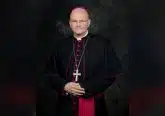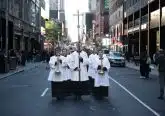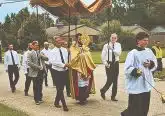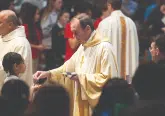Two-mile procession June 19 to launch Eucharistic revival in Detroit archdiocese
Detroit, Mich., May 30, 2022 / 12:00 pm
Belief in the Real Presence of Jesus in the Holy Eucharist is waning among professed Catholics, and the U.S. bishops are trying to do something about it.
According to a 2019 Pew Research Center study, roughly two-thirds of U.S. Catholics do not believe that the bread and wine at Mass become Christ’s body and blood during the consecration — a core dogma of the Catholic faith and the “source and summit” of the Church’s life, according to the catechism.
In response, the U.S. Conference of Catholic Bishops this summer will launch a three-year grassroots revival of devotion and faith in the Real Presence of Jesus in the Eucharist, culminating in the first National Eucharistic Congress in the United States since 1975.
Catholics in the Archdiocese of Detroit will have a chance to participate in such a revival on Sunday, June 19, the feast of Corpus Christi, when Archbishop Allen H. Vigneron will lead a two-mile Eucharistic procession from the Cathedral of the Most Blessed Sacrament to Sacred Heart Major Seminary in Detroit.
While processions typically take place across the archdiocese during the feast, also known as the Solemnity of the Most Holy Body and Blood of Christ, this year’s will take on a special significance, said Sr. Esther Mary Nickel, RSM, director of worship for the archdiocese.
“(The procession) is an opportunity for Jesus to draw people to Himself, and so we take Jesus to the streets, and we pray,” Sr. Nickel told Detroit Catholic.
Sr. Nickel said she remembers participating in Corpus Christi processions in Rome with Pope St. John Paul II, when onlookers would join as the congregation moved through the streets. Already, the archdiocese’s procession is drawing interest, she said.
“One of the (Detroit police) officers from the precinct who will help us with safety asked, ‘What is this about? What are we really doing?’” Sr. Nickel said. “I responded and said, ‘It’s a pilgrimage, and we’re not here to stay. We’re on our way to heaven, and this is a symbolic representation of how we’re on our way to heaven together as we go to the streets.’”
The procession will begin with Mass at 1 p.m., followed by exposition of the Blessed Sacrament at the Cathedral of the Most Blessed Sacrament on Woodward Avenue. The faithful will then process with the Blessed Sacrament down Chicago Boulevard, concluding with benediction at Sacred Heart Major Seminary.
Organizers are praying for good weather and a large attendance, especially among families, priests, Catholic school students, the Knights of Columbus and other apostolates, said Marlon De La Torre, Ph.D., director of evangelization and missionary discipleship for the archdiocese.
“When you look at the timing of the Eucharistic revival, and you look at the beauty of the feast of Corpus Christi and what it represents and that the fact that it also falls on Father’s Day (this year), I think you get a wonderful opportunity to galvanize the archdiocesan community, galvanize families and focus and place our trust in the Lord and the Holy Eucharist, especially (following the) pandemic,” De La Torre said.
After two years of suffering, hardship and change, it’s an opportunity to focus on Christ and help draw people back to the faith, De La Torre added.
“I think this is a beautiful new springtime of evangelization, a new way to usher in the gifts of the Church and the gift of our Lord,” he said.
While most Catholics probably couldn’t explain the theology behind the Eucharist, by giving public witness to the holiness of the sacrament, families can deepen their appreciation for the great gift Jesus gives, Sr. Nickel said.
“I don’t think my mom could have explained the theology of transubstantiation to me, but we were at Mass every Sunday,” Sr. Nickel said. “We’re drawn (to the Lord at Mass), even if we might not be able to articulate it. I pray the Eucharistic revival will help us understand why we’re drawn.”
The U.S. bishops’ National Eucharistic Revival will be broken into three parts: a Diocesan Year of Eucharistic Revival from June 2022 to June 2023, a Parish Year of Eucharistic Revival from June 2023 to June 2024, and in July 2024, a National Eucharistic Congress in Indianapolis, Ind.
During the diocesan phase, De La Torre said the Archdiocese of Detroit will seek to strengthen and empower Families of Parishes to establish their own Eucharistic devotions, whether 40-hour devotions or perpetual adoration.
The second year will involve more formation training workshops, Eucharistic conferences and other sessions geared toward evangelization, doctrinal formation, liturgy, and apologetics with the aim of bringing people together for prayer. Ultimately, the archdiocese wants to encourage parishes to foster creativity and enthusiasm in promoting Eucharistic devotion, De La Torre said.
“A lot of it will be a focus on the family itself,” De La Torre said. “That’s the key for us, focusing on the role of the mother, the role of the father, and the role of the caregiver, and instituting a hands-on approach to delivering the Catholic faith to their children and making sure they really understand the fruits of the Church and that they know who Jesus Christ is.”
De La Torre believes it isn’t a coincidence that the Eucharistic revival is taking place during the archdiocese’s Year of Prayer for Priestly Vocations, which Archbishop Vigneron will inaugurate with a holy hour June 4 in response to a shortage of priests in the archdiocese and across the United States.
The body and blood of the Lord are intimately tied to the priesthood, De la Torre said.
“This beautiful procession brings a spotlight to the role of the priesthood, and with the archbishop leading the procession, with our auxiliary bishops assisting, with our priests assisting throughout the route, they are a band of brothers,” De La Torre said. “That’s something a young man can see — this isn’t just an isolated event where men come together and just disperse. No, this is a band of brothers brought together to serve the Lord and to proclaim Jesus Christ.”
But it’s not just priests who can find strength in the Eucharist, De La Torre added. All of the faithful can bring their sufferings, worries and oppressions to the Lord.
“I would encourage people to look at the Eucharistic procession as an opportunity to break free from those chains, from those bonds that are holding you back,” De La Torre said, “to really allow the Lord to embrace you.”
This article was first published May 16 at the Detroit Catholic, and is reprinted at Catholic News Agency with permission.













